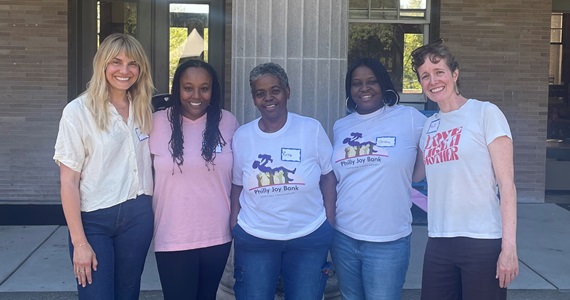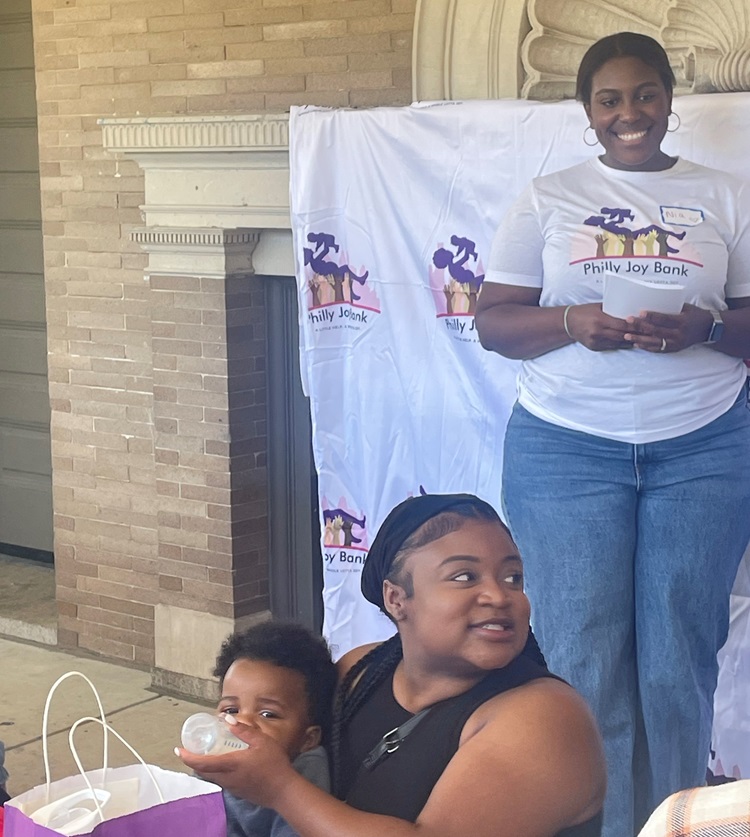Reflecting on More Than a Year of Philly Joy Bank, a Community-Driven Guaranteed Income Program
 L to R: Elizabeth Valdez, Erikka Gilliam, Rita Nelson, Christina Brown, and Ali Groves
L to R: Elizabeth Valdez, Erikka Gilliam, Rita Nelson, Christina Brown, and Ali Groves
October 15, 2025
In the summer of 2024, Philadelphia launched the Philly Joy Bank (PJB), a pilot program aimed at reducing racial disparities in infant mortality.
The PJB initiative provides a guaranteed monthly income of $1,000 to 250 expectant families in three low-income neighborhoods with the city’s highest infant mortality rates. Participants receive the no-strings-attached payments during pregnancy and for up to 12 months after giving birth.
PJB aims to reduce racial disparities in birth outcomes and advance health equity by empowering families to address unmet economic needs. In addition to the monthly payments, participants are referred to optional services and resources that support families’ health and wellbeing during and after pregnancy.
To determine whether and how PJB impacts birth outcomes and other related health outcomes, researchers at Drexel University's Dornsife School of Public Health are conducting an evaluation study of the program. Ali Groves, PhD, MHS, associate professor of community health and prevention, and Elizabeth (Libby) Salerno Valdez, PhD, MPH, assistant professor of community health and prevention, co-lead this evaluation team. Erikka Gilliam, MS, MPH, senior community engagement manager in the Urban Health Collaborative, Nora Lee, PhD, assistant research professor of epidemiology, and community researchers, Christina Brown, Rita Nelson, and Hyden Terrell are also part of the team.
Now, with more than a year of the program underway, some insights are available from survey data and testimonials.

It is estimated that to raise one child in Philadelphia you need an income of at least $96,977, according to Living Wage Calculator. Forty nine percent of families in the program have a family household income of $10,000 or less.
Over half of all participants were between age 25-34 when they enrolled in the program.
To date, the program has disbursed nearly $2,938,000 in cash to participants and also provided nearly 400 referrals to other care services available through the Department of Public Health.
More than 100 participants opted to receive financial counseling, 93 participants sought lactation support programming, 89 participants inquired about Safe Sleep programming, 59 participants were connected to Philly Families CAN services, and 42 participants were referred to a community doula support program.
“As part of the PJB evaluation, we met with a small group of participants and engaged them in participatory arts-based research. Data from these powerful sessions showed that this money is doing something really extraordinary during pregnancy for PJB participants,” said Valdez. “We are eager to see what impacts the PJB will have on babies and their families.”
Testimonials uncovered participants’ ability to secure housing, food, and reduce stress:
“My kids now have space…not a forever home but a step up.”
“This program really has blessed me…not only can I get gas, but I can get stuff for a new baby girl. I can get other things for the house. I can get food when stamps run out.”
“To know that $1,000 is even still going to come after the baby is here…even though I’m stressing about the surgery, I’m not stressing financially.”
To celebrate the successes of the program, participants, community evaluators, the evaluation study team, funders, local representatives, and staff from Philadelphia Department of Public Health (PDPH) including Dornsife alumna Palak Raval-Nelson, PhD, MPH, health commissioner for PDPH, gathered at Smith Playground on October 4, 2025, for an anniversary celebration.
“It was truly heartwarming to see the parents and their babies, whose lives have been touched by the PJB,” shared Groves. “For the past year, our evaluation team has had the privilege of hearing their stories and the impact the program has had on them, but nothing compares to the joy of seeing them in person. On a crisp, beautiful fall day, their smiles and the babble of their little ones were a testament to the real difference this program is making in their lives. It was a moment that made all the effort and dedication of everyone working on the PJB feel even more meaningful.”
Learn more about the event and program in a recent WHYY piece.
Philly Joy Bank was developed by Philadelphia Community Action Network (CAN), a collective impact stakeholder group whose goal is to reduce racial disparities in the city’s infant mortality by fostering a learning community and coordinating cross-sector actions. The program received funding from the William Penn Foundation, Spring Point Partners, Philadelphia Health Partnership, Vanguard, the Barra Foundation, the Jewish Healthcare Foundation and The Pew Charitable Trusts. City funds will be used to cover program staffing and evaluation.
Learn more about the Philly Joy Bank